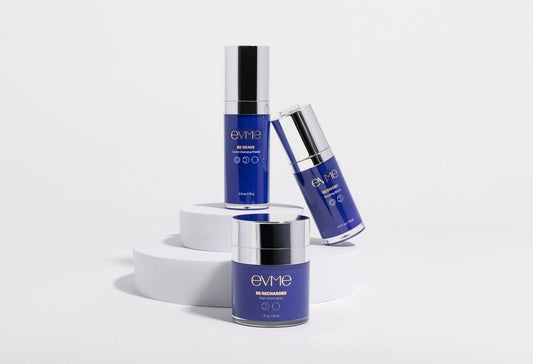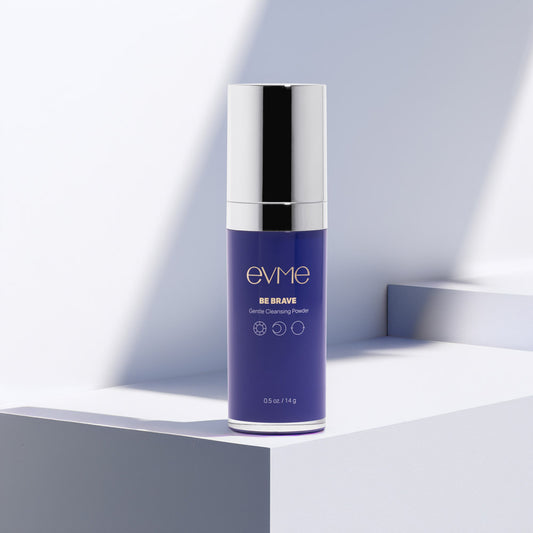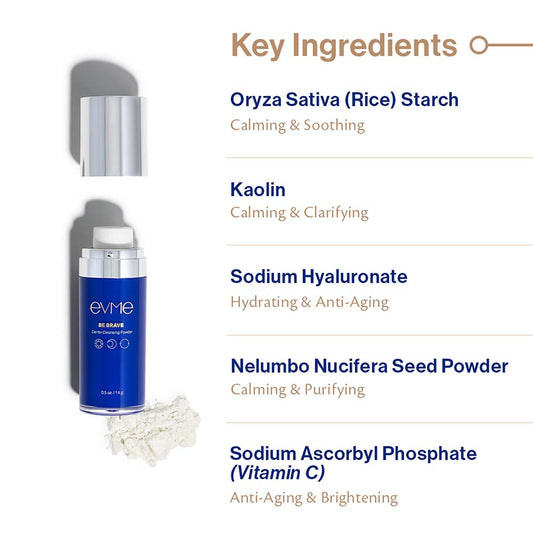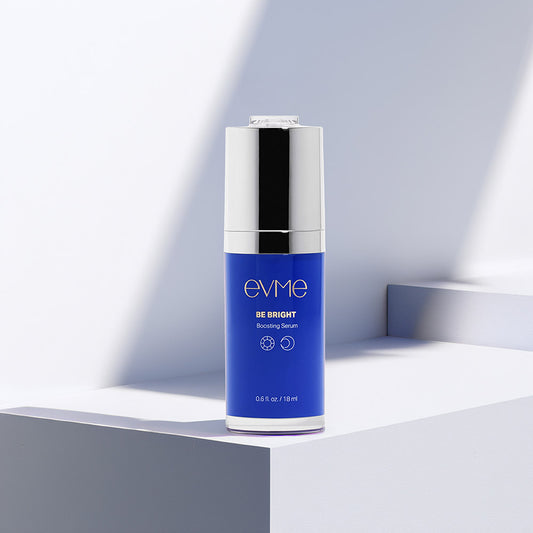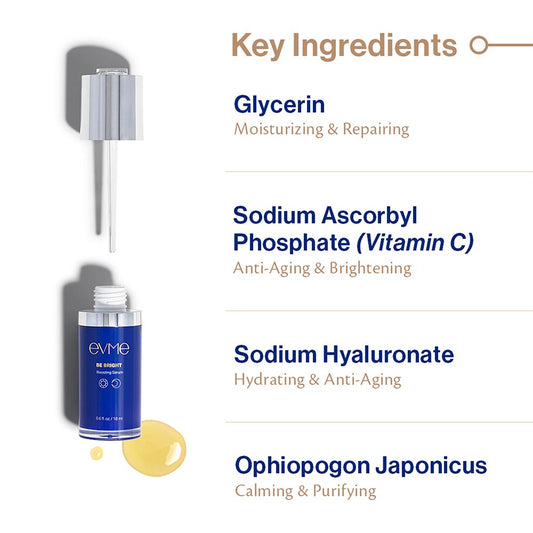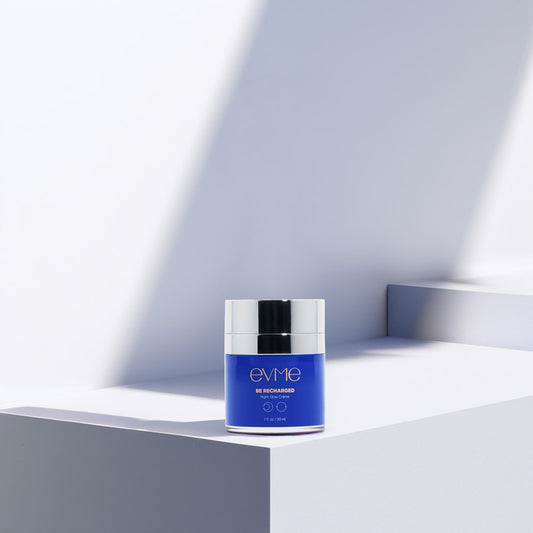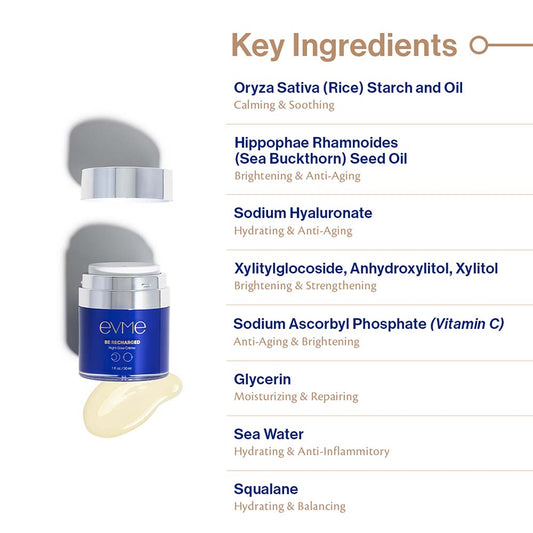Try Evme, allergist-created luxe skincare for sensitive and allergic skin.
Shop All ProductsCould I Have Eczema?
September 20, 2022

Back To Articles
What is Eczema?
Eczema, also known as atopic dermatitis, is a chronic skin disease that often starts early in life, in childhood, but can affect adults as well.
About 1 in 10 people will experience eczema in their lifetimes, and over 15-20% of children are afflicted with eczema globally.
What are the Common Causes of Eczema?
Eczema is a term often used by the general public to describe all allergic skin rashes. In reality, it is a very specific medical condition, with distinct causes and symptoms.
The primary disease process in eczema is considered to be epidermal barrier dysfunction, or a disrupted skin barrier. The skin becomes dry since the water is able to leak out via transepidermal water loss, which then can trigger itching.
There also may be some genetic factors that lead to eczema. Several mutations have been identified in a family of genes called the epidermal differentiation complex on chromosome 1q21, including filaggrin, which is a crucial protein involved in creating tight junctions at the skin barrier. Maintaining the correct acidity of the skin is also important in maintaining the skin barrier, and filaggrin also plays a role in this.
What are the Symptoms of Eczema?
The main symptom of eczema is itchy, dry skin that often produces an “itch-rash” cycle. The itch-rash cycle describes a process common in people with eczema – eczema causes skin to feel itchy, which subsequently causes a rash, which then becomes more itchy, resulting in a circular process where individuals with eczema are constantly itchy and rashing.
Eczema can occur anywhere on the skin, but tends to occur in the folds of the skin, affecting the arm folds, behind the knees, wrists, ankles, hands, and neck area. Eczema is characterized by itchy, dry, scaly patches of skin, occasionally causing vesicles and oozing in more severe cases.
What Triggers Commonly Affect Those With Eczema?
Although eczema can occur in non-allergic people too, it is often associated with allergic disease. Eczema has been found to be associated with other types of allergic diseases like asthma, environmental allergies, and food allergies. In fact, close to 40% of children with moderate to severe eczema also have food allergies. Individuals with a parent with atopic dermatitis, asthma, or environmental allergies are more likely to develop atopic dermatitis.
More specifically, there are certain triggers that may irritate the skin, breaking down the skin barrier further, which may also contribute to worsening eczema. These triggers include irritants found in personal care products that are exposed to the skin, as well as environmental allergens such as dust mites, pollen, and animal dander. Food allergies can also trigger eczema, as described above. Avoidance of potential irritants and environmental triggers for eczema can be helpful in eczema prevention.
Can Eczema Be Cured?
Eczema is a chronic condition that waxes and wanes, and is not likely to be “cured.” However, there are several things you can do at home to help with eczema.
First and most importantly, it is crucial to moisturize your skin regularly to help reduce the dryness of the skin which triggers the itch-rash cycle. Thick emollient creams followed by application of a barrier cream (like petroleum jelly) at least twice a day can be helpful to moisturize the skin and keep the moisture within the skin.
Second, we also recommend daily baths with lukewarm water. The reason? Hot water can often pull moisture out of the skin and regular baths can help moisturize the skin more, especially when followed with a good moisturization routine.
How Can a Person With Eczema Prevent a Flare-up?
Patients with eczema are also at higher risk for skin infections, including superinfection with bacteria and viruses. Fortunately, there are a number of ways to prevent flare-ups.
Topical Corticosteroids/Topical Immunomodulators
Topical corticosteroids and topical immunomodulators are the primary medications used for treatment of eczema. These can be very helpful, but there is definitely an art and a science to getting this right. It’s important to treat the skin when it is necessary, but learn how to use the medications sparingly so you don’t get unwanted side effects like thinning of the skin (primarily with steroids).
Diluted Bleach Baths
For moderate to severe eczema, we will occasionally recommend diluted bleach baths, which can be helpful in preventing superinfection. Ask your doctor for more information about this. It may sound scary (but it’s really not!) and it works really well.
Antibacterial Topical Treatments and Antihistamines
Other therapies include antibacterial topical treatments and antihistamines. In severe cases, systemic immunosuppressives or biologic treatments are also options.
Dupilumab
Dupilumab, an injectable monoclonal antibody treatment for moderate to severe eczema, can be used for eczema that’s resistant to conventional treatment. This has been shown to reduce itching and rashing, as well as the frequency of atopic dermatitis flares.
When Should a Person With Eczema See a Doctor?
Individuals with eczema could benefit from seeing an allergist if they are having trouble managing their symptoms on their own, if the eczema is worsening, or if they would like to understand if allergies are playing a role in their worsening eczema.
Can Evme Help People With Eczema?
People with eczema often have sensitive skin, and using harsh ingredients can worsen their condition. There is also a high correlation of contact dermatitis in people with eczema.
Using Evme can be beneficial for people with eczema because it is formulated to be gentler on the skin compared to most products. Evme's highly moisturizing system is particularly helpful for people with eczema. Additionally, by eliminating known allergens and irritants from our formulas, we aim to minimize the risk of reactive flare-ups.
Recommended articles
close
Evme Sans-Allergenic Skincare Products
- Choosing a selection results in a full page refresh.






